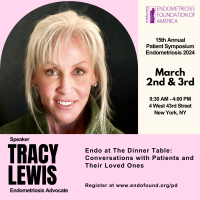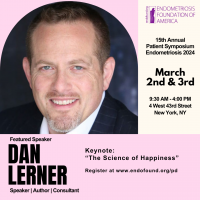
Do you have a burning question for EndoFound’s Honorary Medical Director Emeritus and Senior Medical Advisor, Dr. Harry Reich? E-mail him at harry@endofound.org or visit EndoFound’s official Instagram, Facebook or Twitter, tag us and ask a question with the hashtag #askharry, and you could see your answer featured here!
The landscape facing American women with endometriosis is barren and fraught with inconsistency; a patient's plan of care can vary wildly from one doctor to the next. So how do you find an endometriosis specialist who will give you proper treatment? Here's my checklist of sorts. A top 10 tips list to help you steer clear from the docs who are nots.
-
No rectovaginal exam? No way! A rectovaginal examination—where a doctor inserts one finger into the vagina and another into the rectum—is the very first step to clue-in on the source of a patient’s pelvic pain and the location of endometriosis growths. This is a quick exam that your doctor should be performing during an in-office consultation, especially if you experience pain during sexual activity. If you have complaints of tenderness in an area, this is the way to zero in on it. Without this basic examination, your doctor will miss examining half of your pelvic anatomy. The upper half is the bladder and uterus. During the rectovaginal examination, the bottom half can be felt, including the ovaries and the uterosacral ligaments supporting the cervix, which are the most common places for endometriosis.
-
You’re being pressured into ovarian suppression Drugs, like Lupron and Orilissa, that cause ovarian suppression are expensive, have a significant amount of side effects and prohibit fertility. Read: if you have endometriosis and want to get pregnant don’t let your doctor talk you into taking these drugs! These medications rarely result in pregnancy when deep endometriosis exists and may make surgical procedures more difficult. These drugs mess around with the hypothalamo-pituitary axis or the area that secretes the hormones that stimulate and release the ovaries. Just as alarming: we do not know, in the case of long- term usage, if the drugs help or hurt a woman’s chances of later conception.
-
Too many imaging tests before surgery Be suspicious of any doctor who orders up too many tests involving imaging without clinical confirmation such as—you guessed it—a rectovaginal exam. These tests include an MRI, CAT scan and ultrasound. What’s a test without any idea of what you’re looking for? It's garbage. A competent endometriosis specialist will order a test to confirm what he or she already suspects when it comes to locating endometriosis within.
-
Laparoscopy without biopsy, pictures or video This is what I call a “cashectomy.” Why? Because the doctor is simply extracting cash from the patient without knowing what he’s doing. A pathology report of the biopsied tissue from surgery is the only way to definitively diagnose endometriosis. A thorough endometriosis surgeon will habitually document the removal of these lesions whether it be pictures or videos or both to keep a historical record of the patient’s surgical treatment in case of disease persistence.
- A recommendation for only cyst surgery Most pain from endometriosis is not caused by an ovarian cyst but by deep endometriosis. If a doctor wants to go in and remove the ovarian cyst, (which is really the easiest part of the surgery) and leave all of the disease behind, there will be no relief for the patient and the patient will leave the hospital with almost as much disease as they started with.
-
Rectum, rectum, rectum! Painful endometriosis usually means rectovaginal endometriosis, not vaginal endometriosis. Be sure your surgeon has the ability to treat rectal lesions. If the doctor doesn’t do any rectal surgery, seek out a specialist to work with your surgeon. Remember: endometriosis almost always involves the bowel, but usually does not go very deep. Still, it is imperative to remove the disease from the bowel to decrease or eliminate disease persistence.
-
Ten is the magic number If you ask your doctor how many endometriosis-related surgeries he or she has performed in the last year, and if the answer is less than 10, book it out of there, and look for another surgeon. A good endometriosis surgeon will do at least 50 or more procedures in a calendar year. I know one who does over 200 a year!
- Your doctor is a jack of all trades The best obstetricians may not be the best endometriosis surgeons. Endometriosis should be the sole focus of your specialists’ practice. If not, say sayonara to that master of none.
-
A paper trail of bad reviews If you check Yelp, HealthGrades and the like and see a large amount of negative reviews from past patients, obviously, don’t proceed.
- Forcefully pushing you towards hysterectomy I’ve said it before, and I’ll say it again: A hysterectomy should be the patient's choice, not the doctor’s choice. Beware of doctors who are pushing you to have a hysterectomy. Should you not want one, there are always options. With endometriosis, there is always a choice. You don't ever have to have a hysterectomy because of endometriosis. The only exception to that rule is if you have cancer.
Melanie K. asks: So he doesn’t want surgery for pain reduction? I was on [birth control] at 16, and it didn’t help my disease at all. And why do they always talk about having a baby. What if we never want that?
Thanks Melanie for your feedback about my last column regarding my colleague, Professor Charles Chapron. I do want surgery for endometriosis patients, especially patients who have pelvic pain, but I also do want to feature other specialists' opinions on this site in the interest of continuing the conversation and spreading awareness around endometriosis. My opinion was and is: excision of endometriosis works best for pain, and, questionably for infertility. Endometriosis specialists are pain doctors first. We want to convert the anatomy from abnormal to normal.
Editor’s note: The opinions, beliefs, and viewpoints expressed by Dr. Harry Reich in this column are solely his own and based on his experience.









